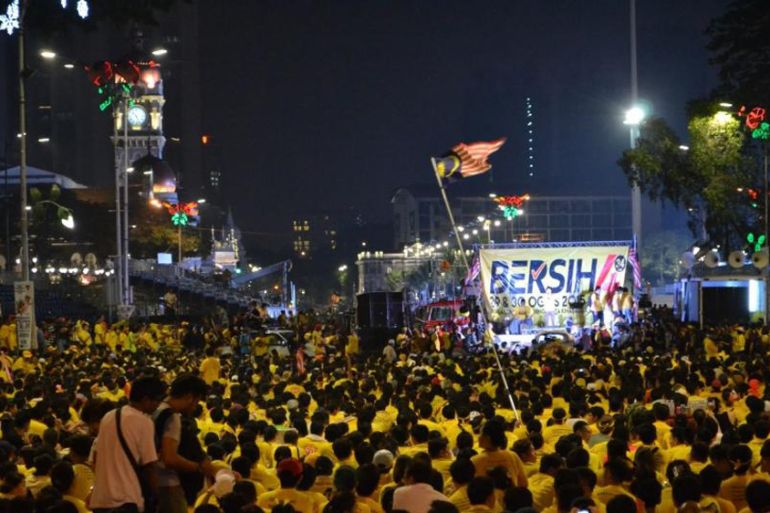HRW: Malaysia government creating culture of fear
Malaysia in danger of becoming a “failed democratic state” as it continues to stifle criticism, Human Rights Watch says.

Malaysia is in danger of becoming a “failed democratic state” if it continues on its current path of repression against government critics, according to Human Rights Watch.
In a damning new report Creating a Culture of Fear, The Criminalization of Peaceful Expression in Malaysia, HRW on Tuesday detailed the various ways the Malaysian government has used its laws to stifle criticism.
Keep reading
list of 4 itemsGeorgia’s president vetoes controversial ‘foreign agents’ bill
‘Regime machinery operating efficiently’ as Tunisia cracks down on dissent
Why Egypt backed South Africa’s genocide case against Israel in the ICJ
The crackdown on freedom of expression began after the 2013 election when the ruling Barisan Nasional coalition lost the popular vote for the first time since independence.

But HRW said the wave of repression has only intensified in the last year, as public discontent surfaced over the weak economy and the massive corruption scandal surrounding the state investment firm 1MDB and a $700m “political donation” deposited into a personal bank account of Prime Minister Najib Razak.
Human Rights Watch sought comment from the Malaysian government about their report, but have yet to receive a response.
“For many people the idea Malaysia could be in a human rights crisis does not make sense,” Brad Adams, Asia director of HRW said. “The country seems to work.”
But, said Adams, there is another picture: “One where we have the opposition leader in prison on trumped-up charges, a media controlled by authorities and told what to print and where we have a large number of charges against people who are simply critics of the government.”
Colonial era Sedition Act
The colonial era Sedition Act has been used widely to try to silence critics. Najib had promised to repeal it in 2012 after abolishing the Internal Security Act, which allowed for indefinite detention.
But the sedition law is still on the statute books and seems used more widely than ever.
The report’s author, Linda Lakhdhir, said that between 2007 and 2013 only three charges of sedition were brought. But between 2013 and 2015 that figure rose to 33.
One such case is that of law professor Azmi Sharom. He was arrested earlier this year and charged with sedition for comments he made about a political disagreement in Perak state six years ago.
Sharom challenged the charges as unconstitutional as the Sedition Act was introduced during British rule. But Malaysia’s highest court threw out his challenge.
Lakhdir said there had been a lull in new sedition charges while the case was being heard but that she now expects that more charges would be laid soon against critics, and existing ones would move forward through the courts.
Lakhdir also cited how the Printing Press and Publications Act was being abused. The government banned the Yellow Bersih 4 T-shirts worn by demonstrators during that organisation’s August protests merely because they had the words ‘Bersih’ (clean) written on them.
Bersih chairperson Maria Chin Abdullah was herself charged with participating in an illegal protest after she spoke at an opposition ‘Kita Lawan’ (we fight) protests in March.
The hearing is due to be heard in December, but she wasn’t actually charged until six months after the rally.
“You have to question the timing of the charges,” she told Al Jazeera. “When there’s more criticism of the prime minister they haul out the cases. The prime minister has to start dealing with the issues [facing him] rather than just arresting or investigating us.”
Chin added she doesn’t see an end to the crackdown, and echoes Human Rights Watch’s stance that the government is abusing the law to stifle its critics and popular dissent.
“It’s getting crazy. The more the prime minister feels insecure, the more he will use the law against us.”